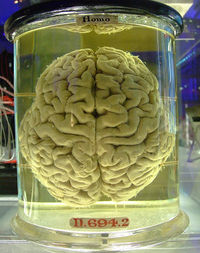Agile Management - Authority & Delegation View more presentations from Jurgen Appelo.
I’m Out of Control
Yesterday I suffered a typical case of food-poisoning. While my body was busy jettisoning the unwanted stuff from all sides, I had ample time to realize how little control I have over my own bodily system.
I don’t actively control my own heart rate, or my digestive system, or my breathing, or my blood pressure, or my sleep, or my immunity system, or anything else. These activities are all taken care of by subsystems within the bigger system that I call me. I would even dare to suggest that me is nothing more than a virtual system. It thinks it’s in control, and it can even communicate with other virtual systems that think they are in control. But at the end of the day it’s our real bodily subsystems doing all the work, on their own. And they leave only a minor window open for what we’d like to call “free will”. About the only thing I do control with my free will is what I eat. (And boy, my subsystems definitely made me suffer for that!)
And you know what? The delegation of control does not stop at those subsystems either! My immunity system has no central control. There is no master neuron in my brain to control my thinking, and no master pacemaker cell to regulate my heartbeat. All control is distributed again among the parts. And for good reason too:
A single controlling authority is neither robust nor flexible.

If there was a clear advantage to central control, then natural selection (or God if you wish) wouldn’t have chosen distributed control as the principle design philosophy for organisms. This is easy to understand: if my immunity system were controlled by a central authority, it would be much easier to take it down. It wouldn’t be as robust as it is now. And if my brain had just one central controlling neuron, it would never be able to keep learning and inventing new stuff everyday. It just wouldn’t be flexible enough.
People are accustomed to thinking in terms of central control, with clear chains of command, from top to bottom. But such a hierarchy falls apart in systems where every part influences every other. The more complex these interactions are, the less likely it is that one authority can control it.
Kevin Kelly, writer and expert in digital culture, lists a number of “Laws of God” in his book Out of Control, of which these are the first two:
- Distribute being: A complex system is more than the sum of its parts. The “extra” part is distributed among the system. It cannot be attributed to any single authoritative part.
- Control from the bottom up: In a complex system everything happens at once, and problems route around any central authority. Therefore overall governance must be spread among all the parts.
Does this mean that there is no role for managers? I’m glad to say it doesn’t! (Or I would be talking myself out of my own job right now…) In a distributed system there is sufficient room (and need) for specialization. There are about 210 known distinct human cell types. Most cells deal with execution, some cells deal with management. In fact, every stable complex system needs parts that deal with controlling it. The challenge is how to draw the lines between control and production.
The dilemma of when to control and when not to control is a well-known problem. (In fact, financial institutions and governments are working on that right now.) I don’t claim to know all the answers. But I do have plenty of time to think about it in my bathroom…
picture by Gaetan Lee
Subscribe to this blog with a reader or by email!
Latest, greatest and favoritest posts:
The Rate-Your-Manager Test!
Rubber Chicken Management
How to Select a Fine Technical Manager



